

What's Your Animal Personality Type? Shyness.com. A conversation on TED.com: What are some optimal professions for introverts? Tests. Shopping Cart. ISTJ (Examiner) Personality Type - Jungian. Psych Central - Personality Patterns. Based upon the International Personality Item Pool (IPIP) Everybody is curious about their personality, so psychology to the rescue!

Our personality test is similar to the Myers Briggs (MBTI) and the Jung personality tests, and is based upon an open-source set of personality testing items. These items are based upon scientific research and will provide results typical of a five-factor model of personality. The five factors measured by this test are extraversion, agreeableness, conscientiousness, emotional stability, and intellect/imagination. Please remember that these are only personality traits or preferences -- they do not predetermine every action you prefer in every situation. Self-defeating personality disorder. Self-defeating personality disorder (also known as masochistic personality disorder) is a proposed personality disorder.
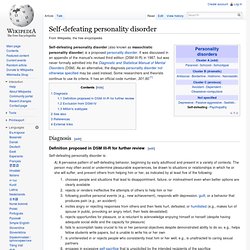
It was discussed in an appendix of the manual's revised third edition (DSM-III-R) in 1987, but was never formally admitted into the Diagnostic and Statistical Manual of Mental Disorders (DSM). As an alternative, the diagnosis personality disorder not otherwise specified may be used instead. Some researchers and theorists continue to use its criteria. It has an official code number, 301.90.[1] Diagnosis[edit] Definition proposed in DSM III-R for further review[edit] Self-defeating personality disorder is: A) A pervasive pattern of self-defeating behavior, beginning by early adulthood and present in a variety of contexts.
B) The behaviors in A do not occur exclusively in response to, or in anticipation of, being physically, sexually, or psychologically abused. C) The behaviors in A do not occur only when the person is depressed. Revenge of the Introvert. After ten years as a psychologist practicing psychodynamic psychotherapy , I reclined on the couch of my own analyst feeling burdened by my chosen work. After a day of seeing patients, I was drained. Mental illness in children: Know the signs - Page 1 - MSN Health & Fitness - Kids' Health. Hierarchy of conditions for perfect m... - INFP personalities - tribe.net. Page 59 of DSM-IV-TR Diagnositic Statistical Manual of Mental Disorders The most common associated feature of Expressive Language Disorder in younger children is Phonological Disorder. There may also be a disturbance in fluency and language formulation involving an abnormally rapid rate and erratic rhythm of speech and disturbances in language structure (cluttering).
When Expressive Language Disorder is acquired, additional speech difficulties are also common and may include motor articulation problems, phonological errors, slow speech, syllable repetitions, and monotonous intonation and stress patterns. Among school-age children, school and learning problems (e.g., writing to dictation, copying sentences, and spelling) that sometimes meet criteria fo Learning Disorders are often associated with Expressive Language Disorder. Sensing or iNtuition Preference. The 16 Type Patterns. *Adapted from Linda V.
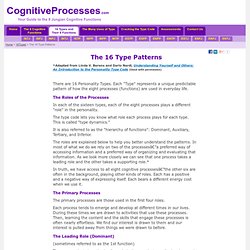
Berens and Dario Nardi, Understanding Yourself and Others: An Introduction to the Personality Type Code (Used with permission) There are 16 Personality Types. List of Personality Disorders. The 7 Habits of Highly Playful People. Affirmations for Introverts. I'm all about self-affirmations this week. I covered affirmations for pessimists on another blog, now I'm thinking about affirmations for introverts . Self-affirmations, when spoken aloud, can sound kind of silly. OK, sometimes they sound a little silly even when you say them silently to yourself.
But if we can permit ourselves a Stuart Smalley moment now and then, affirmations can come in handy to remind us of things we might already know but forget in moments of insecurity. They can help us hold our ground when others are trying to force their values on us, and they can give us that last little push we need to open our mouths and assert ourselves.
I particularly like and often use the old standby "Different strokes for different folks. " A few others, for various circumstances: Just because I'm quiet doesn't mean I have nothing to say. Brain Difference In Psychopaths Identified. Professor Declan Murphy and colleagues Dr Michael Craig and Dr Marco Catani from the Institute of Psychiatry at King's College London have found differences in the brain which may provide a biological explanation for psychopathy.

The research investigated the brain biology of psychopaths with convictions that included attempted murder, manslaughter, multiple rape with strangulation and false imprisonment. Using a powerful imaging technique (DT-MRI) the researchers have highlighted biological differences in the brain which may underpin these types of behaviour and provide a more comprehensive understanding of criminal psychopathy. Dr Michael Craig said: 'If replicated by larger studies the significance of these findings cannot be underestimated. The Four Temperaments. Around 500 years before the birth of our Savior, the spirit of science began to be applied to the practice of medicine.
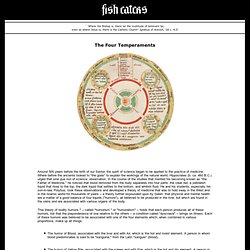
Where before the ancients looked to "the gods" to explain the workings of the natural world, Hippocrates (b. ca. 460 B.C.) urged that sine qua non of science: observation. In the course of the studies that merited his becoming known as "the Father of Medicine," he noticed that blood removed from the body separates into four parts: the clear red, a yellowish liquid that rises to the top, the dark liquid that settles to the bottom, and whitish fluid. This theory of bodily humors 1 -- called "humorism " or "humoralism" -- holds that each person produces all of these humors, but that the preponderance of one relative to the others -- a condition called "dyscrasia" -- brings on illness. Each of these humors was believed to be associated with one of the four elements which, when combined in various proportions, make up all things: The REAL Personality Types Made Relevant.
THE FOUR TEMPERAMENTS. A) The choleric is full of himself.
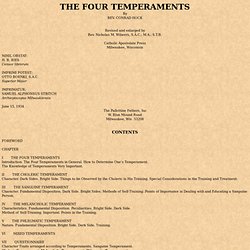
He has a great opinion of his good qualities and his successful work and considers himself as something extraordinary and as one called upon to perform great feats. He considers even his very defects as being justified, nay, as something great and worthy of praise; for instance, his pride, his obstinacy, his anger. The good-enough mother. Disciplines > Psychoanalysis > Concepts > The Good-Enough Mother Description | Discussion | See also Description Winnicott sees the key role of the 'good enough' mother as adaptation to the baby, thus giving it a sense of control, 'omnipotence' and the comfort of being connected with the mother. This 'holding environment' allows the infant to transition at its own rate to a more autonomous position. "The good-enough mother...starts off with an almost complete adaptation to her infant's needs, and as time proceeds she adapts less and less completely, gradually, according to the infant's growing ability to deal with her failure" (Winnicott, 1953)
Philip Zimbardo shows how people become monsters ... or heroes. Personality styles, types, theories and psychometrics models, personality tests and quizzes theory. Personality models on this page The Four Temperaments/Four Humours Carl Jung's Psychological Types Myers Briggs® personality types theory (MBTI® model)
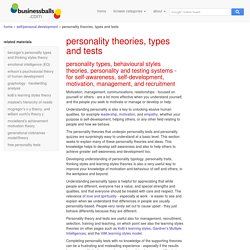
The Introverted Paradox. The Introverted Paradox by I/O.

The Introvert's Corner.